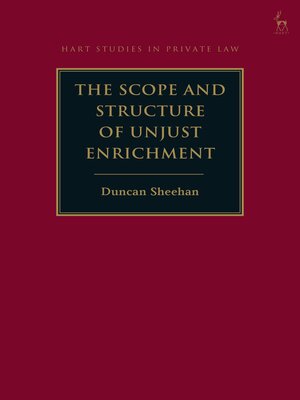
Sign up to save your library
With an OverDrive account, you can save your favorite libraries for at-a-glance information about availability. Find out more about OverDrive accounts.
Find this title in Libby, the library reading app by OverDrive.



Search for a digital library with this title
Title found at these libraries:
| Library Name | Distance |
|---|---|
| Loading... |
This ambitious book grapples with the complex debates ongoing on the structure of unjust enrichment, proving to be a major contribution to the field.
Responding to the subject's critics, it presents a clearly articulated structure for this branch of private law, arguing that while unjust enrichment has the function of reversing defective enrichments (whether by performance or in another way) there is scope for normative pluralism in how the law achieves this.
Drawing heavily on comparative material from Germany, Scotland and South Africa the book then argues for a legal framework which combines elements of the absence of basis and unjust factors approaches. It assesses how that structure can be mapped against the causes of action that make up unjust enrichment, arguing that some are performance claims - reversing a deliberate, intentional performance - and some are non-performance claims. Other claims, often included in books on unjust enrichment, such as "necessity" should be excluded from the subject area. The book concludes with a treatment of defences.
Responding to the subject's critics, it presents a clearly articulated structure for this branch of private law, arguing that while unjust enrichment has the function of reversing defective enrichments (whether by performance or in another way) there is scope for normative pluralism in how the law achieves this.
Drawing heavily on comparative material from Germany, Scotland and South Africa the book then argues for a legal framework which combines elements of the absence of basis and unjust factors approaches. It assesses how that structure can be mapped against the causes of action that make up unjust enrichment, arguing that some are performance claims - reversing a deliberate, intentional performance - and some are non-performance claims. Other claims, often included in books on unjust enrichment, such as "necessity" should be excluded from the subject area. The book concludes with a treatment of defences.







